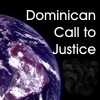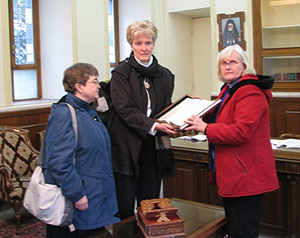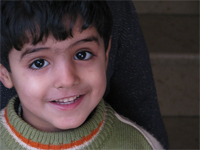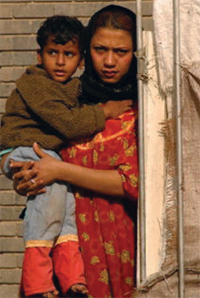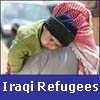 |
| "Therefore, having this ministry by the mercy of God, we do not lose heart. We have renounced disgraceful, underhanded ways; we refuse to practice cunning or to tamper with God’s word, but by the open statement of the truth we would commend ourselves to every person’s conscience in the sight of God.” 2 COR 4:1-2 | |||||
The Family of OUR Family in Iraq
Our visit began in Beirut, Lebanon. Our first full day in Beirut included an opportunity to be with some members of our Dominican Family there. Sr. Maria Hanna, Prioress of St. Catherine Congregation from Iraq, and the local prioress, Sr. Germaine, joined us for mass in the Chaldean Cathedral. After mass, we were invited to their convent perched high in the hills north of the city. Their view of the Mediterranean Sea is breathtaking. The Dominican community there provided us with a feast of traditional Mid-eastern foods. This wonderful hospitality of our Dominican Sisters was a preview of the overwhelming hospitality that we would continue to experience everywhere we visited in Lebanon and Syria. (In Lebanon, two congregations of Dominican Sisters are present: St. Catherine, with two communities; Presentation, also with two communities. Presently, there are no Dominicans in Syria. However, Dominicans have been present in the Middle East since the earliest years of the Order. Jordan of Saxony, second Master of the Order, died in a shipwreck off the coast of Palestine in 1237.) As I contemplate my week-long visit to the Middle East, several threads weave the fabric of the truth that I learned during those days: consequence, desperation; dedication; powerlessness; hospitality.
The consequence or “fall-out” of US policy in the Middle East surrounded us on every side. The US-led invasion of Iraq has not only opened the way for mayhem in Iraq but has also caused enormous problems for neighboring countries. Current estimates (conservative) indicate that 1.5 million Iraqi refugees are in Syria; 700,000 in Jordan; 50,000 in Lebanon. More than 2 million Iraqis are internally displaced in Iraq. Some countries whom the US Government historically denounces are the very ones who have had to “pick-up the pieces” as a result of US policy. Syria, a country the size of North Dakota with a population of about 19 million, is trying to cope with more than 1.5 million Iraqi refugees. In general, Iraq’s neighbors have been tolerant, if not welcoming. The desperation of the Iraqi refugees whom we met was tangible. In small groups, we personally visited the homes of Iraqi refugee families. With my small group, I visited three families in Beirut and two families in Damascus. Due to non-existent or non-renewable visas, most Iraqis in the countries are considered illegal. Apartments are over-crowded, without much furniture, and unheated. As undocumented refugees, adults cannot work legally. Family roles are turned-upside-down as children are sent to work at menial tasks to support their families rather than to school. Increasing numbers of women are driven to prostitution. The effects of trauma and depression are widespread and, for the most part, untreated. The dedication of the Caritas and CRS staff and their
partner organizations, as well as others from UNCHR (High Commission
for Refugees), was extremely impressive. Many of these persons
have spent decades in direct work with refugees and other vulnerable
populations. Most significant for me were the strong, competent,
and courageous women—especially Sisters – who work
tirelessly to address the needs of refugees, particularly refugee
women and children. I remember especially the Good Shepherd
Congregation, Sacred Hearts of Jesus and Mary Congregation, the
Lazarus Congregation (Daughters of Charity), and our own Dominican
Sisters. In 2002, Dominicans began to remind themselves: “I
HAVE FAMILY IN IRAQ.” Some continue to wear buttons/badges
and to display bumper stickers that announce this message. We
want to stand in solidarity with our two congregations of Dominican
Sisters, our Vicariate of Friars and hundreds of our Laity. Even
now, we CONTINUE to have Family in Iraq. However, many of
the family, friends, and neighbors of OUR Family have had to flee
Iraq because of the “murder and mayhem” there. (See
the US Catholic Bishops Delegation Report, July ‘07.) As
Dominicans, we need to proclaim “the open statement of the
truth” to our governments that amends must be made for the
enormous damage done in Iraq. We need “to commend ourselves
to every person’s conscience in the sight of God.” The
family of our Family in Iraq also stands in need of our
solidarity. |
The
Family of OUR Family in Iraq Iraqis are the third largest and fastest growing refugee population in the world. |
||||
